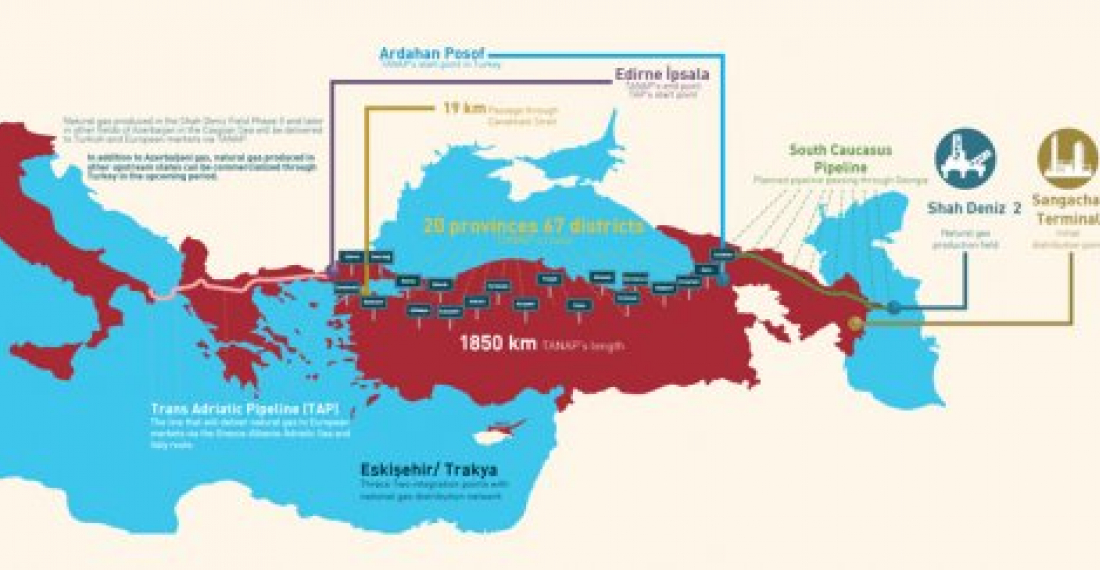The World Bank's Board of Executive Directors on Tuesday (20 December) approved a US$400 million loan for Turkey and a US$400 million loan for Azerbaijan for the Trans-Anatolian Natural Gas Pipeline (TANAP) Project. The project will transport natural gas from a gas field in Azerbaijan to and across Turkey, and further to Europe, aiming to diversify Azerbaijan's gas export markets and improve the security of the energy supply in Turkey and South Eastern Europe.
This project is part of the Southern Gas Corridor Program, which, in addition to TANAP, includes the development of the Shah Deniz 2 gas field in Azerbaijan; an expansion of the South Caucasus Pipeline across Azerbaijan and Georgia to Turkey; and the Trans Adriatic Pipeline (TAP), which carries the gas through Greece and Albania and under the Adriatic Sea to Southern Italy. Reflecting the importance of the Southern Gas Corridor for all countries involved in the program, a number of international financial institutions are supporting the Program, including the European Investment Bank (EIB), the European Bank for Reconstruction and Development (EBRD), the Asian Infrastructure Investment Bank (AIIB), the Asian Development Bank (ADB), and the World Bank Group (WBG).
"We are very pleased to be part of a coalition of partners supporting TANAP, a component of the transformational Southern Gas Corridor, which will bring natural gas from the Caspian Sea to Europe," said Cyril Muller, World Bank Vice President for Europe and Central Asia. "TANAP will not only boost competitiveness and create economic opportunities for people in Azerbaijan and Turkey, it will also support regional trade, improve connectivity, and support energy security in Turkey and in Europe."
The Project will finance infrastructure investments for the TANAP Pipeline System. At 1,850 km, TANAP accounts for over one half of the 3,500 km Southern Gas Corridor pipeline system from Azerbaijan to Italy. TANAP will begin at Turkey's border with Georgia, go through Turkey from east to west, and at the Greek border will connect to the TAP, which will convey the gas to European markets.
In Turkey, with the completion of the project, the security of the country's energy supply will be improved with the addition of 6 billion cubic meters (bcm) per year. TANAP will connect to the Turkish natural gas network in two locations, at Eskişehir and Thrace. The project contributes to the realization of the main strategic objectives of the broader partnership between the World Bank Group and Turkey, including enhanced competitiveness and employment; improved equity and public services; and deepened sustainable development.
In Azerbaijan, the Shah Deniz 2 gas field is being developed to produce 16 bcm per annum and the revenues that will be generated from gas production and transportation will be very important for the country and its citizens. The project contributes to achieving the strategic objectives of the Bank's partnership with Azerbaijan, in particular, supporting stronger economic competitiveness, by integrating Azerbaijan with regional and European energy markets, strengthening its connectivity and transit role, and increasing its exports.
Georgia will also benefit from additional gas to its network as part of the agreement on the transportation of gas from Azerbaijan through its territory to the Turkish border. For the Turkish market, 6 bcm from the Shah Deniz 2 gas field have been contracted; several European gas traders have contracted the remaining 10 bcm for the South Eastern European market. The ultimate beneficiaries are the citizens of Azerbaijan and natural gas consumers in Turkey and across South Eastern Europe.
TANAP will run from the Turkish border with Georgia, beginning in the Turkish village of Türkgözü in the Posof district of Ardahan, will run through 20 provinces including Kars, Erzurum, Erzincan, Bayburt, Gümüşhane, Giresun, Sivas, Yozgat, Kırşehir, Kırıkkale, Ankara, Eskişehir, Bilecik, Kütahya, Bursa, Balıkesir, Çanakkale, Tekirdağ and Edirne until it ends at the Greek border in the İpsala district of Edirne. From this point, the TAP Pipeline will connect to convey natural gas to European nations. Two off-take stations are located within Turkey for national natural gas transmission, one located in Eskişehir and the other in Thrace. With 19km running under the Sea of Marmara, the main pipeline within Turkey reach a total of 1850km, along with off-take stations and aboveground installations
The recipients of funding are the Southern Gas Corridor (SGC) Closed Joint Stock Company with the guarantee of the Republic of Azerbaijan and the Boru Hatları İle Petrol Taşıma Anonim Şirketi (BOTAŞ) with the guarantee of the Republic of Turkey.
source: commonspace.eu with the press services of the World Bank and TANAP






